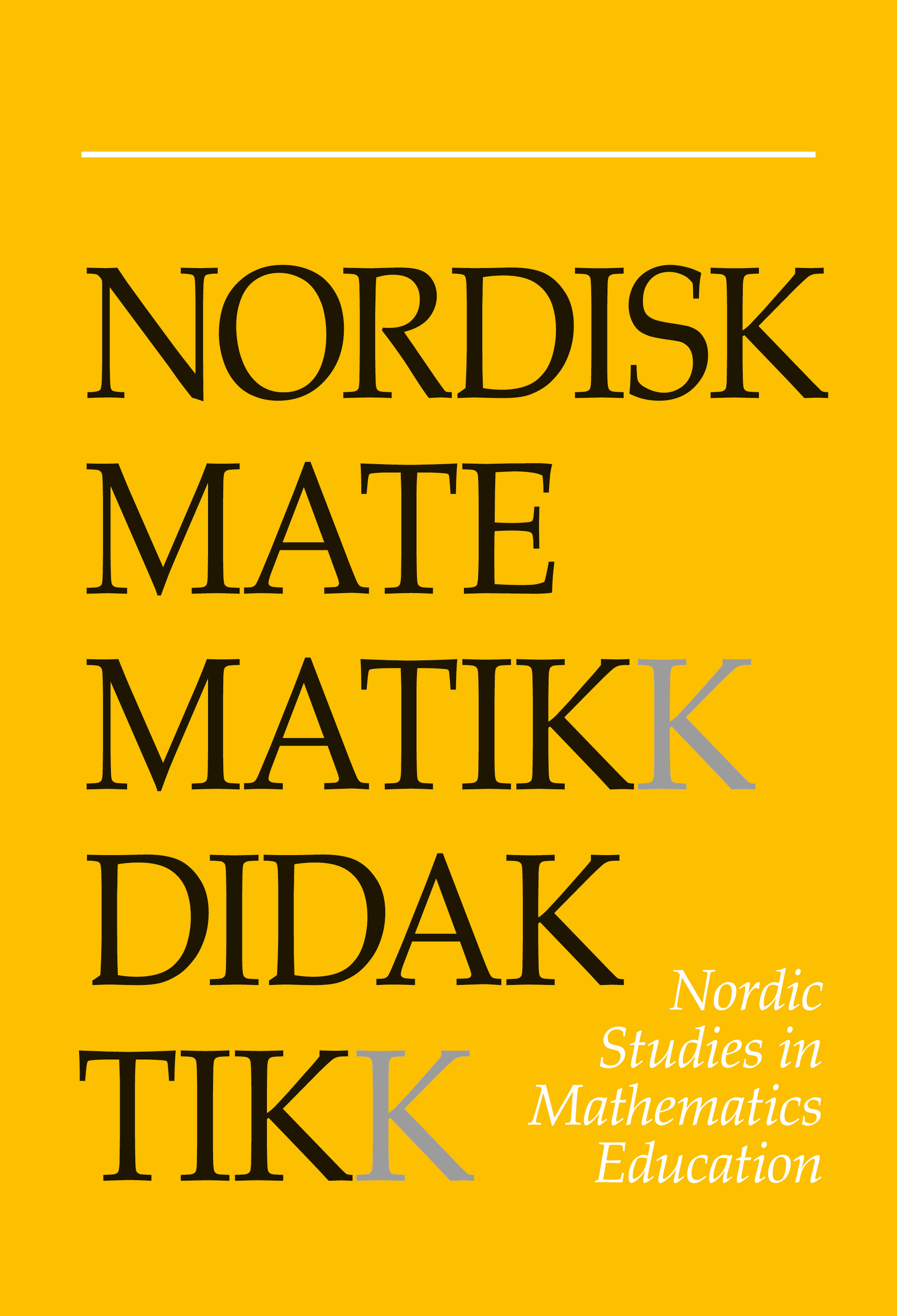Undervisning i problemløsningsstrategier
DOI:
https://doi.org/10.7146/nomad.v3i3.146180Abstract
Artiklen presenterer i første del et rammeverk som dekker sentrale aspekter ved matematisk tenkning. Begrepene som blir beskrevet er: basiskunnskap, strategier, metakognisjon og holdninger. I tillegg blir forholdet mellom dem diskutert. Artiklens andre del er viet strategiundervisning. Søkelyset rettes mot en modell for slik undervisning; hvordan strategier kan undervises ved hjelp av denne modellen, men også hvordan de øvrige komponentene i rammeverket bør stimuleres for å nå målet: økt matematisk kompetanse gjennom rasjonell bruk av strategier. Artiklen konkluderer med at dette rammeverket og denne modellen for undervisning danner et troverdig teoretisk grunnlag for et videre empirisk arbeid med undervisning av strategier.
References
Artzt, A.F. & Armour-Thomas, E. (1992). Developement of a Cognitive-Metacognitive Framework for Protocol Analysis of Mathematical Problem Solving in Small Groups, Cognition and Instruction, 9, 2, s. 137-175. https://doi.org/10.1207/s1532690xci0902_3
Baroody, A.J. (1987). Children's Mathematical Thinking, New York: Teachers College Press.
Bassok, M. (1990). Transfer of Domain-Specific Problem-Solving Procedures, Journal of Experimental Psychology, 16, 3, s. 522-533 . https://doi.org/10.1037//0278-7393.16.3.522
Bell, A., Fischbein, E. & Greer, B. (1984). Choice of Operation in Verbal Arithmetic Problems: The Effects of Number Size, Problem Structure and Context, Educational Studies in Mathematics, 15, s.129-147. https://doi.org/10.1007/BF00305893
Bell, A. (1987). Diagnostic Teaching: Methods and Materials Based on Research on Understanding, Nottingham: Shell Centre for Mathematical Education.
Boero,P. (1990). On Long Term Development of Some General Skills in Problem Solving: A Longitudinal Comparative Study, PME XIV Proceedings, Mexico.
Bondesan, M. & Ferrari, P. (1991). The Active Comparison of Strategies in Problem-Solving: An Explorative Study, PME XV Proceedings, Assisi, Italy.
Borkowski, J.G. & Turner, L.A. (1990). Transsituational Characteristics of Metacognition, Schneider, W. & Weinert, F.E. (eds.), Interactions Among Aptitudes, Strategies and Knowledge in Cognitive Performance, New York: Springer-Verlag. https://doi.org/10.1007/978-1-4612-3268-1_13
Brown, A. (1987). Metacognition, Executive Control, Self-Regulation, and other more Mysterious Mechanisms, Weinert, F.E. & Kluwe, R.H. (eds.), Metacognition, Motiva- tion, and Understanding, Hillsdale: Lawrence Erlbaum Associates.
Bråten, I. (1993). Cognitive Strategies: A Multicomponential Conception of Strategy Use and Strategy Instruction, Scandinavian Journal of Educational Research, 37, 3, s.217- 242. https://doi.org/10.1080/0031383930370304
Chi, M., Feltovich, P. & Glaser, R. (1981). Categorization and Representation of Physics Problems by experts & novices, Cognitive Science, 5, s. 121-152. https://doi.org/10.1207/s15516709cog0502_2
Day, J.D., Cordon, L.A. & Kerwin, M.L. (1989). Informal Instruction and Developement of Cognitive Skills: A Review and Critique of Research, McCormick, C.B., Miller, G. & Pressley, M. (eds.), Cognitive Strategy Research, New York: Springer-Verlag. https://doi.org/10.1007/978-1-4613-8838-8_4
Dufresne, A. & Kobasigawa, A. (1989). Childrens Utilization of Study Time: Differential and Sufficient Aspects, McCormick, C.B., Miller, G. & Pressley, M. (eds.), Cognitive Strategy Research, New York: Springer-Verlag. https://doi.org/10.1007/978-1-4613-8838-8_3
Gallani, J.K. (1989). Schema-Based Strategies and Implications for Instructional Design in Strategy Training, McCormick, C.B., Miller, G. & Pressley, M. (eds.), Cognitive Strategy Research, New York: Springer-Verlag. https://doi.org/10.1007/978-1-4613-8838-8_10
Haylock, D.W. (1987). A Fremework for Assessing Mathematical Creativity in School- children, Educational Studies in Mathematics, 18, s.59-74. https://doi.org/10.1007/BF00367914
Hiebert, J. & Behr, M. (1988). Introduction: Capturing the Major Themes, Hiebert, J. & Behr, M (eds), Number Concepts and Operations in the Middle Grades, Reaston: NCTM, LEA.
Kloosterman, P. & Stage, F.K. (1992). Measuring Beliefs about Mathematical Problem Solving, School Science and Mathematics, 92, 3, s.109-115. https://doi.org/10.1111/j.1949-8594.1992.tb12154.x
Lester, F., Garofalo, J. & Kroll, D. (1989). The Role of Metacognition in Mathematical Problem Solving: A Study of Two Grade Seven Classes. Final report of the NSF project MDR 85-50346.
Lopez-Real, F. & Veloo, P. (1993). Childrens Use of Diagrams as a Problem-Solving Strategy, PME XVII Proceedings, Japan: University of Tsukuba.
McLeod, D.B. (1992). Research in Affect in Mathematics Education: A Reconceptualiza- tion, Grouws, D.A. (ed.), Handbook of Research on Mathematics Teaching and Learn ing, New York: NCTM - Macmillan Publishing Company.
Ostad, S.A. (1990). Hvorfor har barn matematikkvansker? Ogden, T. & Solheim, R. (eds.), Spesialpedagogikk, s.67-80, Oslo: Universitetsforlaget
Paris, S.G. & Byrnes, J.P. (1989). The Constructivist Approach to Self-Regulation and Learning in Classroom, Zimmerman, B.J. & Schunk, D.H. (eds.), Self-Regulated Learning and Academic Achievment. Theory, Research and Practice, New York: Springer- Verlag. https://doi.org/10.1007/978-1-4612-3618-4_7
Polya, G. (1957). How to Solve it (2. utg.), Princeton N.J.. Princeton University Press.
Polya, G. (1981). Mathematical Discovery, New York: John Wiley & Sons.
Pressley, M., Goodchild, F., Fleet, J.,Zajchowski R. & Evans, E.D. (1989). The Challenges of Classroom Strategy Instruction, The Elementary School Journal, 89, 3, s.301-342. https://doi.org/10.1086/461578
Pressley, M. & Harris, K.R. (1990). What We Really Know about Strategy Instruction, Educational Leadership, 48, 1, s.31-34.
Robitaille, D.F. (1990). Achievment Comparisons between the First and Second IEA Studies of Mathematics, Educational Studies in Mathematics, 21, s. 395-414. https://doi.org/10.1007/BF00398860
Rohwer Jr., W.D. & Thomas, J.W. (1989). Domain-Specific Knowledge, Metacognition, and the Promise of Instructional Reform, McCormick, C.B., Miller, G. & Pressley, M. (eds.), Cognitive Strategy Research, New York: Springer-Verlag. https://doi.org/10.1007/978-1-4613-8838-8_5
Royer, J.M., Cisero, C.A. & Carlo, M.S. (1993). Techniques and Procedures for Assessing Cognitive Skills, Review of Educational Research, 63, 2, s.210-243. https://doi.org/10.3102/00346543063002201
Schoenfeld, A.H. (1985). Mathematical Problem Solving, Orlando: Academic Press.
Schoenfeld, A.H. (1992). Learning to Think Mathematically: Problem Solving, Metacognition, and Sense Making in Mathematics, Grouws, D.A. (ed.), Handbook of Research on Mathematics Teaching and Learning, New York: NCTM - Macmillan Publishing Company.
Short, E.J. & Weissberg-Benchell, J.A. (1989). The Triple Alliance for Learning: Cognition, Metacognition, and Motivation, McCormick, C.B., Miller, G. & Pressley, M. (eds.), Cognitive Strategy Research, New York: Springer-Verlag. https://doi.org/10.1007/978-1-4613-8838-8_2
Swan, M. (1984). Problems with Patterns and Number, Manchester: JMB/Shell Center. Symons, S., Snyder, B.L., Cariglia-Bull, T. & Pressley, M. (1989). Why Be Optimistic About Cognitive Strategy Instruction?, McCormick, C.B., Miller, G. & Pressley, M. (eds.), Cognitive Strategy Research, New York: Springer-Verlag.
Downloads
Published
How to Cite
Issue
Section
License

This work is licensed under a Creative Commons Attribution-NonCommercial-ShareAlike 4.0 International License.



